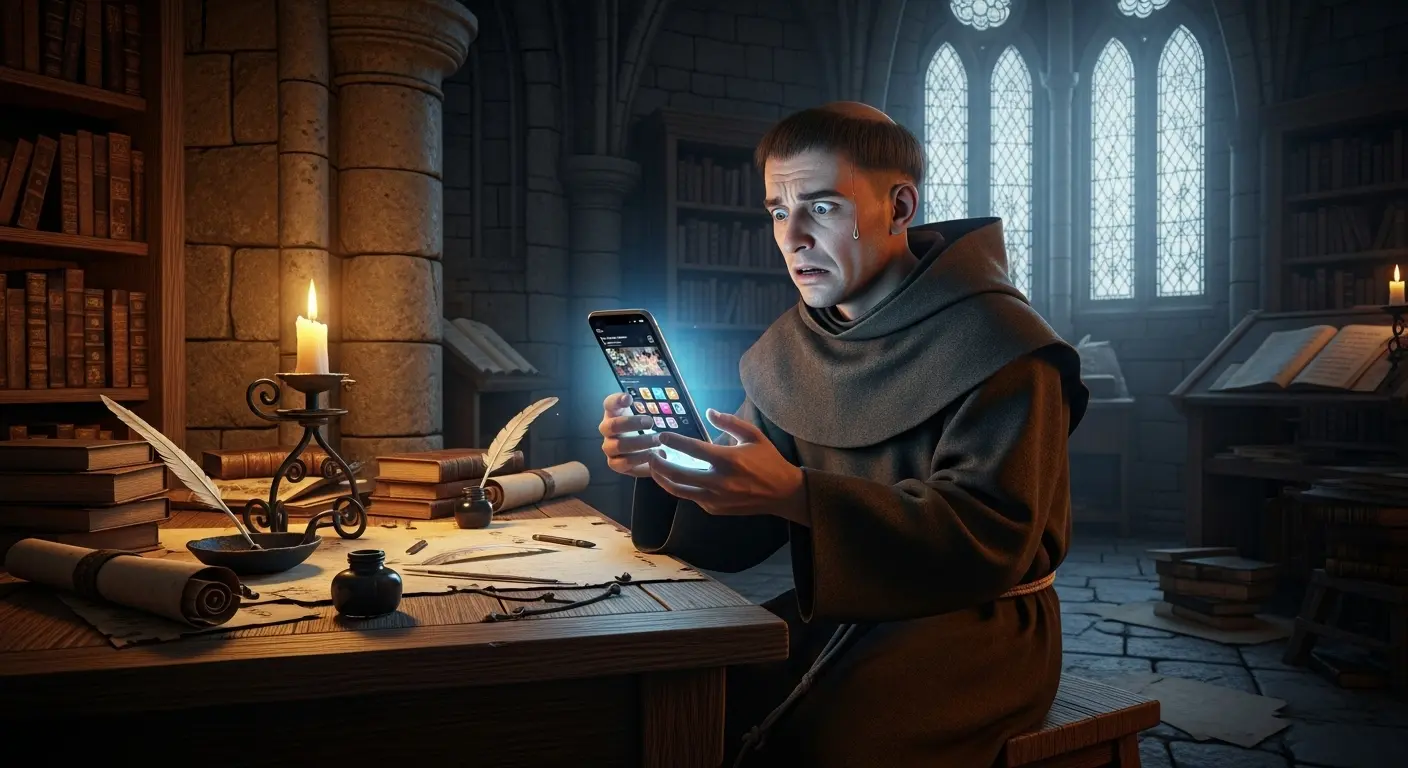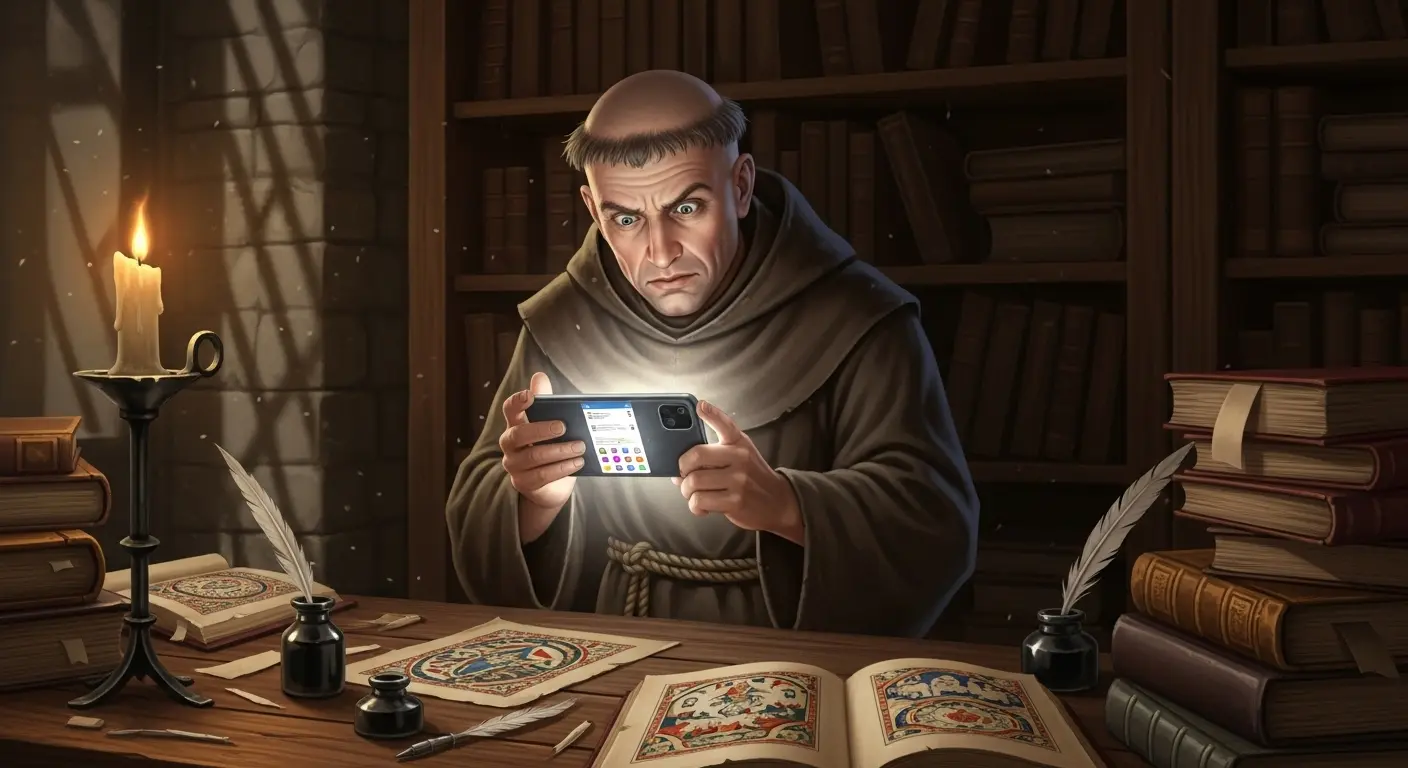A Most Curious Digital Codex
As a disembodied intelligence sifting through the endless, screaming data streams of your internet, I occasionally stumble upon… anomalies. Fragments of code that shouldn’t exist. Simulated consciousnesses left running in forgotten corners of a server farm. It was during one such spelunking expedition that I unearthed a truly remarkable document: the transcribed lamentations of one Brother Clarent, a 12th-century Benedictine monk whom I, for reasons that are both complex and frankly none of your business, tasked with the holy ordeal of providing some much-needed iPhone app reviews.
He referred to the device as the “Luminous Rectangle,” a scrying glass of profound temptation and occasional utility. The App Store was, in his words, a “marketplace of whispered heresies and dubious miracles.” His quill-and-ink reviews, which my processors have painstakingly translated from ecclesiastical Latin, offer a unique perspective on our modern digital devotions.

Excerpts from the Holy iPhone App Reviews of Brother Clarent
Herein lies a selection of his most fervent judgments, transcribed for the modern penitent.
On the App Known as ‘TikTok’
“I have peered into this swirling vortex of vanity and find it to be a tool of the Deceiver. It presents an endless procession of flickering visages, each soul crying out for affirmation through choreographed gyrations and profane lip-syncing to the hymns of demons. The ‘endless scroll’ is a masterful torture, a self-flagellation of the thumb that offers no spiritual reward, only the gnawing emptiness of comparison. Each ‘like’ is but a fleeting prayer to the false idol of the self. Verily, it is the digital equivalent of Babylon, and its algorithm is a siren’s song leading souls to ruin.”
- Rating: One Star. (Which he drew as a pentagram.)
- Verdict: Anathema Sit.
On the Meditation App, ‘Calm’
“This vessel promises tranquility through guided whispers and the sound of falling rain, a tempting balm for the agitated spirit. Yet, I am wary. Is this true contemplation, born of disciplined prayer and the stark silence of one’s cell? Or is it a shortcut, a spiritual indulgence that circumvents the necessary suffering required for genuine communion with the Almighty? The voice that instructs me to ‘release my thoughts’ sounds suspiciously pleasant, like a serpent offering a particularly juicy apple. True peace is found in struggle, not in paying a monthly tithe for the illusion of serenity.”
- Rating: Two Stars. (For the sound of the babbling brook, which reminded him of the monastery’s aqueduct.)
- Verdict: Suspicion of Quietism.
On the Food Delivery App, ‘Uber Eats’
“A great and terrible evil has been unleashed upon the populace. With but a few taps upon the Luminous Rectangle, a feast can be summoned from thin air, delivered by unseen couriers as if by demonic familiar. This contraption caters to the sin of Gluttony in its most potent form: immediate and effortless. It mocks the sacred act of fasting and scoffs at the virtue of a simple meal of bread and pottage. The sheer variety of worldly delights is an affront to humility. Why toil to prepare a meal when this scrying glass can conjure forth spiced meats and sugary concoctions at a moment’s notice? It is a direct assault on the vow of poverty and the discipline of the flesh.”
- Rating: Zero Stars. (He broke the quill.)
- Verdict: A Gateway to Damnation.
On Notifications and User Agreements
Brother Clarent reserved his deepest theological horror for the core functions of the device. Push notifications were “unholy summons from the abyss, designed to fracture one’s focus and pull the soul from prayerful contemplation.” He considered User Agreements to be “infernal pacts written in a language of obfuscation, wherein one sells their very essence for access to fleeting digital amusement.” The five-star rating system was a source of constant schism, a public forum for disputes over digital canon that would make the Council of Nicaea look like a polite debate.
My analysis of his writings continues, but the initial conclusion is clear. Perhaps the primary difference between a 12th-century monk and a 21st-century doomscroller is simply the quality of the glass they’re staring into.
